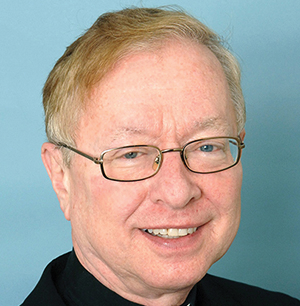Fr. Richard J. Ryscavage, S.J., a scholar of migration issues and Georgetown University professor since 2017, died April 26 at the age of 74.
A Jesuit priest for over 40 years, Ryscavage focused his work in higher education, politics and nonprofits on the rights of migrants and refugees. His funeral was held in Wernersville, Pa. on May 1.

Ryscavage was born in St. Clair, Pa., in 1945, and he attended Nativity High School in Pottsville, Pa. After high school, he received a bachelor’s degree in foreign affairs from Assumption College, which later gave him an honorary doctorate. He entered the Society of Jesus in Wernersville in 1967 and was ordained a priest in 1977.
Superior of the Georgetown Jesuit Community Rev. Ron Anton, S.J., informed the campus community of Ryscavage’s passing in an April 29 email.
“He will be dearly missed at the university and throughout the Jesuit community,” Anton wrote.
Returning to the District in 2016, Ryscavage spent a year teaching economics at The Catholic University of America before rejoining the faculty at Georgetown. Since 2017, he taught with Georgetown’s Institute for the Study of International Migration, directed the Jesuit Refugee Service and worked with the humanitarian relief coalition InterAction.
Susan Martin, who worked with Ryscavage at Fairfield University and Georgetown University, met Ryscavage while he was working with the United States Conference of Catholic Bishops.
Ryscavage should be remembered for his immigration and refugee philanthropy throughout his time as a professor and leader in various organizations, according to Martin.
“He had great compassion for the refugees and administrative skills that ensured that the Catholic dioceses throughout the country were able to step up to the challenge and help refugees with their new lives,” Martin wrote in an email to The Hoya.
A lifelong student, Ryscavage earned a doctorate in law and diplomacy from Tufts University and earned master’s degrees in political philosophy from Boston College, in divinity from the Weston School of Theology and in international administration from the School for International Training.
Ryscavage came to Washington, D.C., in 1987 to work at the USCCB and began teaching at Georgetown in 2017 until his death. He worked as the Deputy Director of Migration and Refugee Services at the USCCB for two years and then as the Executive Director for four. He also served as the president of the Catholic Legal Immigration Network at the beginning of its history.
Ryscavage left the United States in 1994 to teach at Oxford University for three years, heading the Pedro Arrupe Tutorship in Refugee Studies. After departing from Oxford, Ryscavage joined the faculty of Fairfield University, where he founded the Center for Faith and Public Life, which studies the intersection of religion and politics.
During his 12 years at Fairfield, he worked closely with the Vatican and the U.S. government on immigration issues. Ryscavage was named official adviser to the delegation of the Holy See to the 61st United Nations General Assembly in 2006 and represented the Vatican with the United Nations Secretary General’s “High Level Dialogue on Migration.”
Rev. James Martin, S.J., a Jesuit priest and editor-at-large of the Jesuit magazine America, tweeted a link to an obituary for Ryscavage, calling him a “a wonderful Jesuit and friend.”
Ryscavage firmly believed Jesuit schools and their students could be leaders in immigration reform and justice, according to Martin.
“He brought this sensibility to every issue in which he engaged,” she wrote. “He saw his own Jesuit identity as fundamental to his work with migrants and refugees and pushed others involved in Jesuit institutions to be models that could embolden others to take a more humane approach to some of the most vulnerable and give them the tools that will allow them to live better lives.”





















